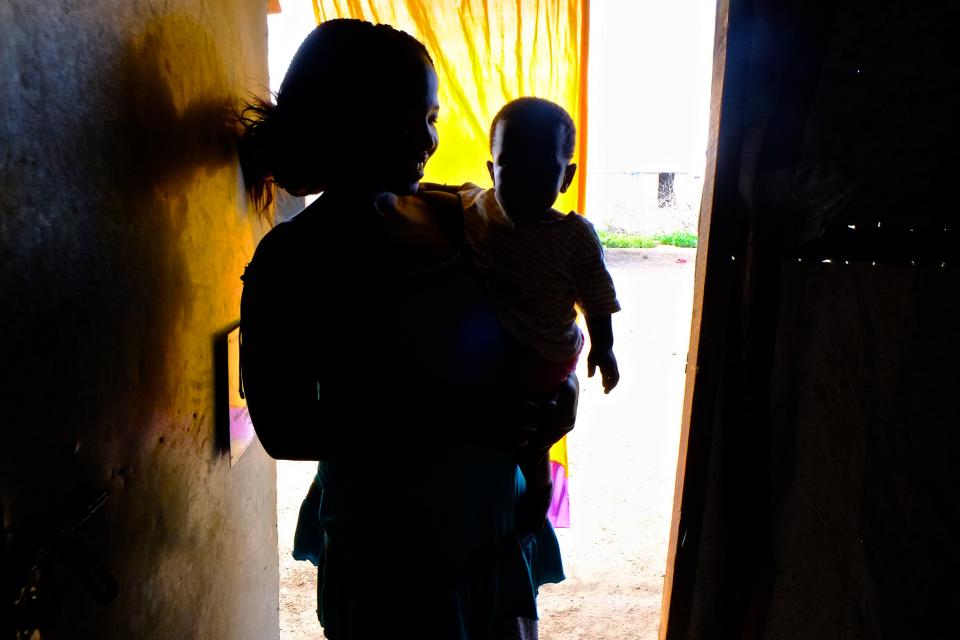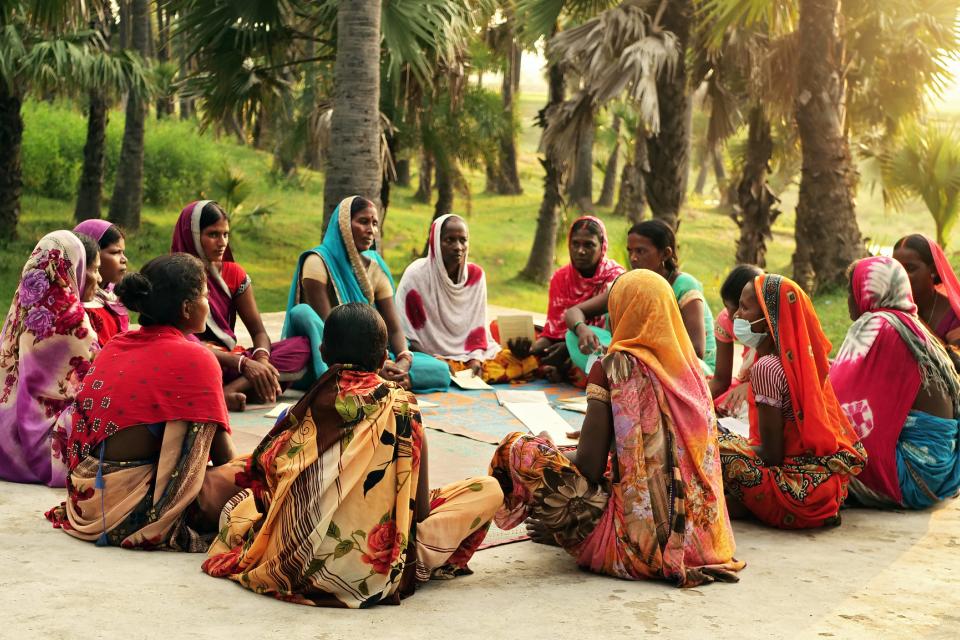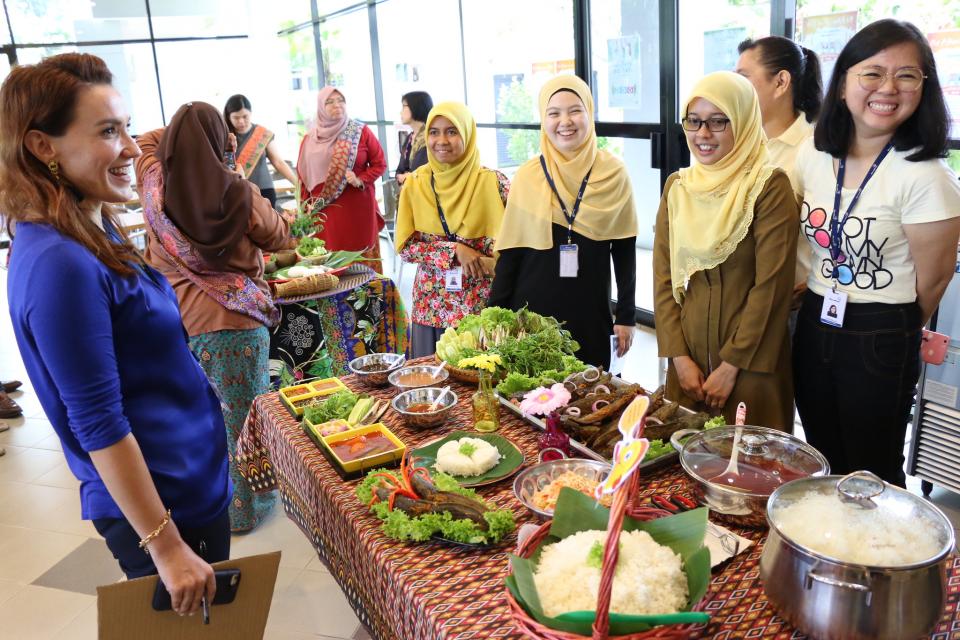Gender equality, women’s empowerment and food systems
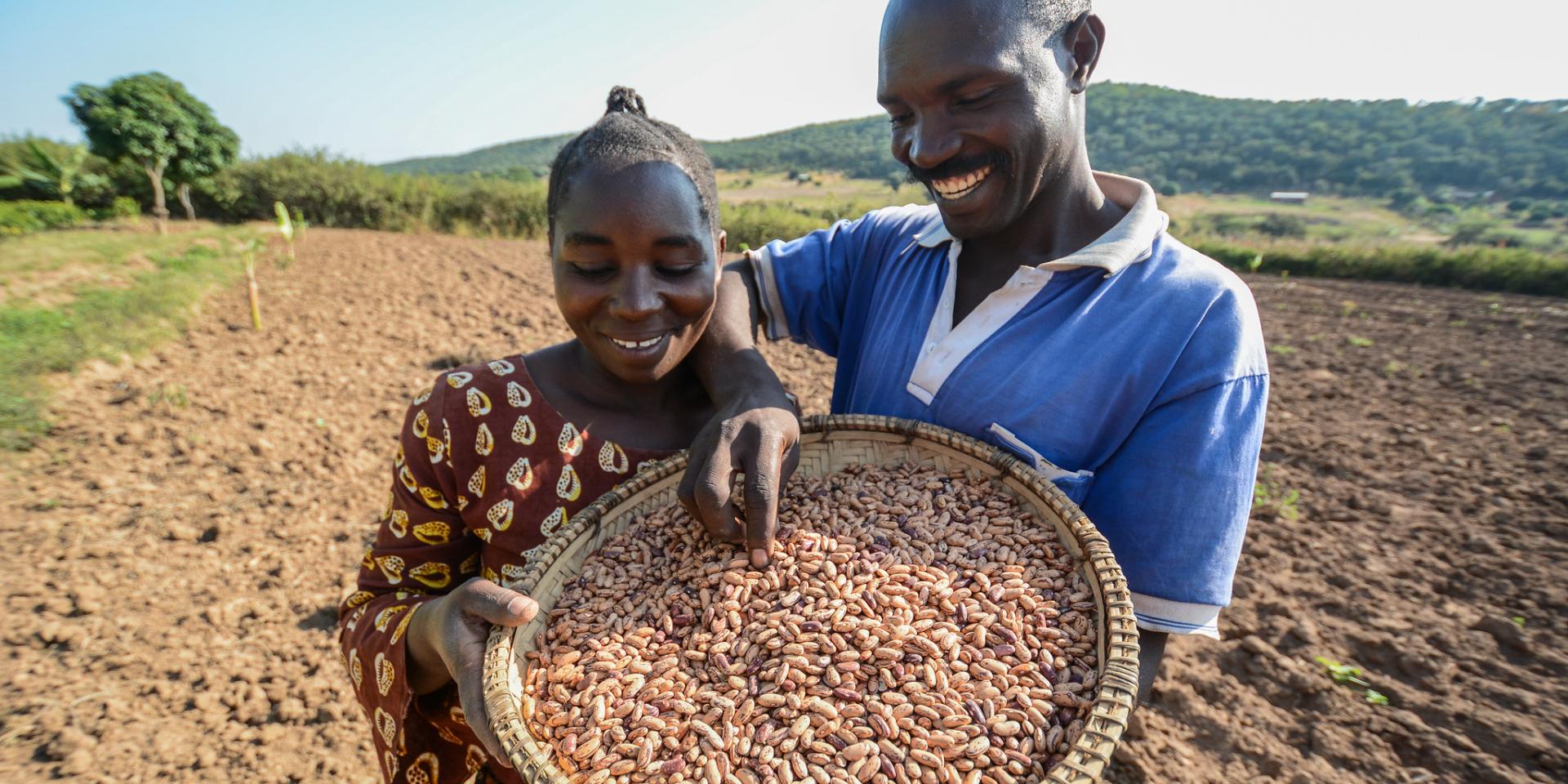 Photo: GeorginaSmith/©2016CIAT
Photo: GeorginaSmith/©2016CIAT
Achieving gender equality and women’s empowerment in food systems can result in better food security and nutrition and in more just, resilient and sustainable food systems for all. However, women’s contributions remain mostly undervalued, unpaid or overlooked in food systems research. At Cultivating Equality 2021, CGIAR gender scientists presented existing evidence, while partners highlighted priority actions and research needs to progress gender equality in food systems.
In advance of the UN Food Systems Summit, this July, CGIAR gender scientists presented the current evidence on links between gender equality, women’s empowerment and food systems to set the record straight on women’s important but oft-overlooked roles. The aim was to ensure that the Summit and its recommendations were grounded in science and evidence, explained Jemimah Njuki, Africa Director, International Food Policy Research Institute (IFPRI), when she spoke at the closing plenary of the Cultivating Equality 2021 conference, organized jointly by the CGIAR GENDER Platform and Wageningen University.
Women are producers, workers, processors, traders, retailers and consumers, added Njuki. In spite of this, they face many challenges and limitations such as social, institutional and cultural barriers to access and adopt agricultural information, technologies, opportunities, resources and services:
“The stark gender inequalities in food systems are both a cause and outcome of unsustainable food systems and unjust food access, consumption, and production. These exist within a broader social context, where there are constraints and limitations shaped by social and structural inequalities in food systems and society at large,” Njuki stated.
A framework for advancing gender equality and women’s empowerment in food systems
In an earlier session during Cultivating Equality 2021, Njuki and colleagues presented their proposed framework for how to systematically integrate gender in all components of the food systems. They emphasized how food system drivers, whether biophysical and environmental, technology and infrastructure, political and economic, sociocultural or demographic, are built on gender inequalities.
Njuki explained: “Food system drivers are anchored in a gendered system with structural gender inequalities and are shaped by shocks and vulnerabilities that affect men and women differently.” That’s why, she added, “transforming food systems in equitable ways requires changes at the individual and systemic levels and at the formal and informal levels."
Njuki went on to present four domains of gender equality and women’s empowerment that influence how women and men can participate in and benefit from food systems: women’s agency, access to and control over resources, gendered social norms as well as policies and governance:
“The idea is to use these four domains when we analyze value chains, food environment, and consumer behavior. If you just focused on women’s agency without looking at the access to and control of resources or without looking at the norms, then the impact we will have will be limited because all these are interconnected. Women operate within social, political, governance and institutional contexts that also have to change.”
In other words, these are the four domains within which change can be nudged along to effect greater gender equality in food systems, with benefits for all:
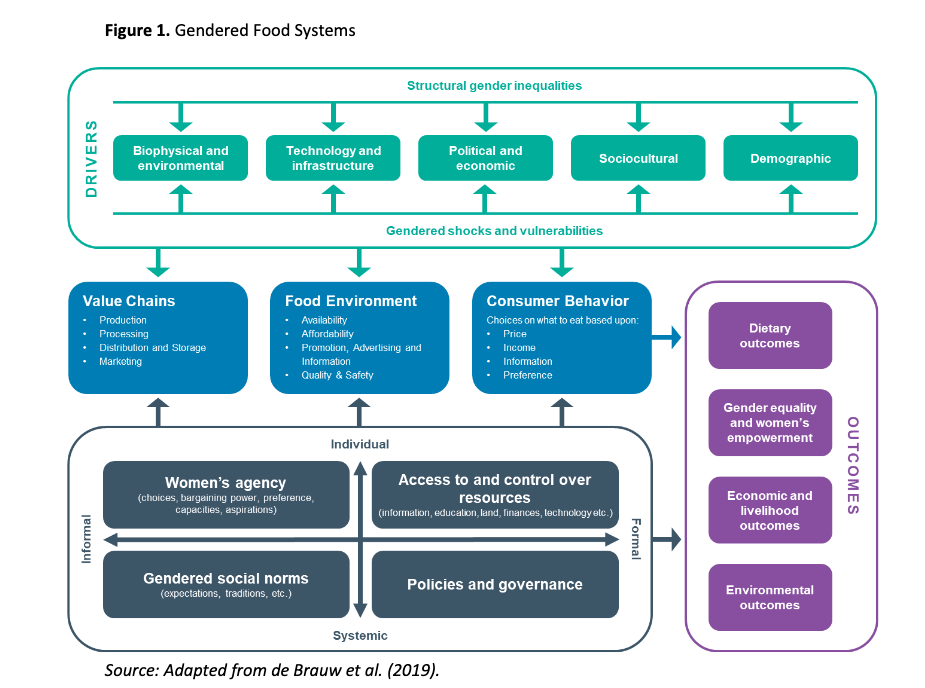
What does the evidence show?
| Domain | Evidence |
|---|---|
| Women’s agency: Decision making and leadership |
Positive nutrition, livelihood, well-being and resilience outcomes occur when women are more involved and have greater influence in household decision-making. Increases in women’s empowerment, including women’s participation in community leadership, is associated with higher agricultural productivity; and women from more food-secure households are more likely to participate in community leadership roles. Women who own land have greater influence in household decision making regarding agricultural or productive decisions Increasing women’s voices and integrating their preferences into agricultural solutions, including technology design and implementation had a positive outcome. |
| Gendered access to and control over resources, services and technology |
Gender-sensitive program designs that aim to increase access to technologies have positive impact on women’s nutrition, health, access to financial services, other technologies and positive outcome on food security. Women face social, cultural and institutional barriers to access and adopt agricultural technologies, information and services Access to resources and empowerment can be linked to nutrition outcomes and children’s educational outcomes. |
| Gendered social norms | Social and cultural norms shape and reinforce ways in which women and men can participate in, access, and benefit from opportunities i.e., norms can hinder women’s ability to access or adopt new agricultural products. |
| Institutional barriers, policy and governance | There is a lack of institutions and policies supporting gender equality and women’s empowerment in food systems, lack of policies and institutional capacities across a range of contexts and tension between formal legislation and practiced law such as where women’s personal property rights differ from legal definitions. Where there is legal legislation and policies, there is a huge gap between the laws and their enforcement. |
Ways forward and future research needs
“There is need to conceptualize research across all these four domains of gender equality and women’s empowerment across the food systems. I believe this is where systemic change starts to happen,” Njuki concluded, before opening a panel discussion on what’s next for gender research in food systems.
Afsana Kaosar, a Professor at James P Grant School of Public Health (JPGSPH), BRAC University in Bangladesh, spoke about the need to address power structures:
“Women are deprived of their rights and access to health, nutrition, education and justice due to social, economic, cultural and political issues. Without changes in the systems, it is difficult to make the changes that we are expecting. The power structure and relations in the world are dominated by the patriarchal and capitalist society.” She went on to say that women’s empowerment issues should be contextualized, and local power dynamics considered.
Structural barriers standing in the way of women’s empowerment were also highlighted by Susan Kaaria, Senior Gender Officer in the Social Policies and Rural Institutions Division (ESP) of the Food and Agriculture Organization of the UN (FAO):
“We have never paid attention to gendered social norms. If we want to have sustainable results and empower women, we must address those social structural barriers. We must think about gender-transformative approaches and integrate them into our work.”
She also underscored the need to engage decision and policy makers:
“We need to bring these good practices and lessons to decision and policy makers. We really need this evidence to influence policies and global instruments produced by governments.”
Karl Deering, Partnerships and Research, Food and Water Systems Team at CARE USA, echoed the need for gender-transformative approaches:
“We need to measure our own performance on applying gender transformative-approaches. We need more qualitative evidence and participatory research. More research on collective leadership and action,” he said.
He also highlighted the importance of collecting sex- and age-disaggregated data, which was supported by Reema Nanavaty from SEWA India:
“Although food systems are one of the most complex systems, our knowledge about it is based on anecdotal data. There is a need for evidence at all levels.”
Deering emphasized the need to involve men and boys in gender equality and women’s empowerment issues:
“We need research that challenges our assumption about the role of men in driving gender equality. Engaging men and boys in gender equality and women’s empowerment is a big push. Engage them in gender dialogues at households and community level to shift our social norms.”
Brave leadership needed
Finally, Corinna Hawkes, University of London (Nutritious Foods Working Group Lead for UNFSS Action Track 4), discussed the issue of breaking barriers for women leadership:
“We need courageous leadership in tackling issues in nutrition and food systems. Many women have enormous potential and skills in leadership in food systems but are being held back because of leadership norms and practices.”
Hawkes further described the characteristics of the kind of leadership that can break barriers in food systems, putting out a call for gender scientists, in CGIAR and beyond, to be brave and persistent in leading the way forward:
“We need leadership that understands complexity, recognizes the differences between stakeholders in the system. We need leaders willing to deviate from the norm, stand up with ambition and lead with purpose. We need people who are very patient, happy to learn and adopt, focused on collective leadership, listening with curiosity, ability to reflect and understand our own environment and situation, connect with each other as well as share vulnerabilities.”
